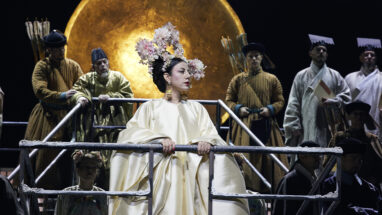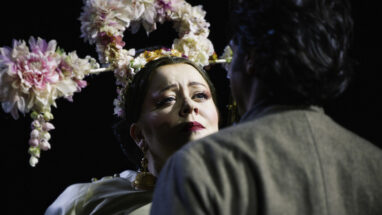
”Beneath the layers there’s a contemporary story of our society”
Giacomo Puccini’s Turandot will be premiered on the main stage of Finnish National Opera in spring 2023. Director Sofia Jupither shares her thoughts about Turandot.
”Puccini worked long and meticulously on his last opera, Turandot. Puccini didn’t get to finish the final pages, and Turandot’s world premiere took place after the composer’s death in Milan in 1926. In the spirit of his time, Puccini’s work was awash with oriental influences. Perhaps he wanted his opera to express something personal, yet he had to find a backdrop for his message that was remote enough from his own life. Hence Puccini set his work to a distant land in the Far East and in mythical, ancient times.
The character of Turandot and the history of the work overall have multiple layers. Puccini composed the opera in the heyday of exoticism and orientalism – a Europe-centric view of the Far East. As we pull down decades-old stereotypes embedded in the work and reveal the people beneath them, the central themes of the opera come to include both the psychology of the characters and a story of our society.
“On a general level, the story of Turandot applies to all of us: it makes us think about who and what we’re expected to be in our society.”
Along with the fantastic music, the interesting layers of this opera encompass the themes of the private and the public, power and responsibility, and love and vulnerability. As in many of his other works from Tosca to Madama Butterfly, the composer introduces characters who are trapped by their identity. Like Tosca, Turandot is forced to adhere to a certain public image constrained by traditions and pressures from other people. Both characters must bear the constant weight of a role in which they are not content.
On a general level, the story of Turandot applies to all of us: it makes us think about who and what we’re expected to be in our society. People often want to force each other into compartments and only see others through their own preconceptions. I look at Turandot as an object of oppression by power structures: her public life as a princess is only a front that she is forced to uphold. As other princesses like Turandot have experienced through the ages, too, the pressures derive from other people and the traditions which we, the human race, have created. In my direction, I want to set Turandot free of these external demands.
“Turandot is a genuinely choral opera, for which Puccini has composed his perhaps most impressive choral music ever.”
There are of course several other central roles in the production besides Turandot: Timur, Calaf and Liù with their multifaceted interrelations. The emperor’s ministers Ping, Pang and Pong are fascinating characters, to whom I’ve taken a similar approach as to Turandot, with the aim to discover the individuals behind the masks. Who is it that they really are? Why have they ended up in their position? In my eyes they resemble Turandot very much. They must also play their official part, but in reality they are longing for something else.
Turandot is a genuinely choral opera, for which Puccini has composed his perhaps most impressive choral music ever. Above all, the choir’s role is psychologically significant. Its purpose is to tell the story of how individuals become part of a larger crowd. The choir in Turandot is a group of people comprised of individuals, the blood-thirsty nation of the opera. The most glaring example of this is the execution scene early on, in which people revel in the entertainment of witnessing a brutal death penalty. When the crowd sees the helpless Prince of Persia awaiting his execution on the stage, it softens. Here the choir tells a merciless, even sad story of the way our society works. When people who are strangers to us, ”others,” are elsewhere, we are untouched by the most hideous of cruelties. But when we have to face those people as individuals in front of our very eyes, we soften. This phenomenon has its dangers, particularly if we fail to understand that we are all individuals.
Traditionally, Turandot has featured dated gender roles, misogyny, and racist stereotypes. It is particularly important for the future of the entire opera art form that these problematic themes are discussed, as that is the only way we can make a difference to them. Together with the creative team we have aimed to remove all the dated layers of the performance tradition from our production. This approach to Turandot is our humble attempt to find ways of making central works of operatic history viable the modern day.
The same problem applies to opera classics at large. Like Turandot, operas such as Carmen and Madama Butterfly require us to find novel perspectives. In my opinion we cannot stop performing classics, but it’s clear that the ways to perform them must be changed. It would be truly wonderful if we could all explore together how to bring classics to the modern day. We must have the courage to make new interpretations, but we must also be allowed to fail – and to carry on trying”
Interview PETRA RÖNKÄ
Photo of Sofia Adrian Jupither TOMMY ANDRESEN



